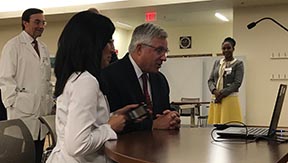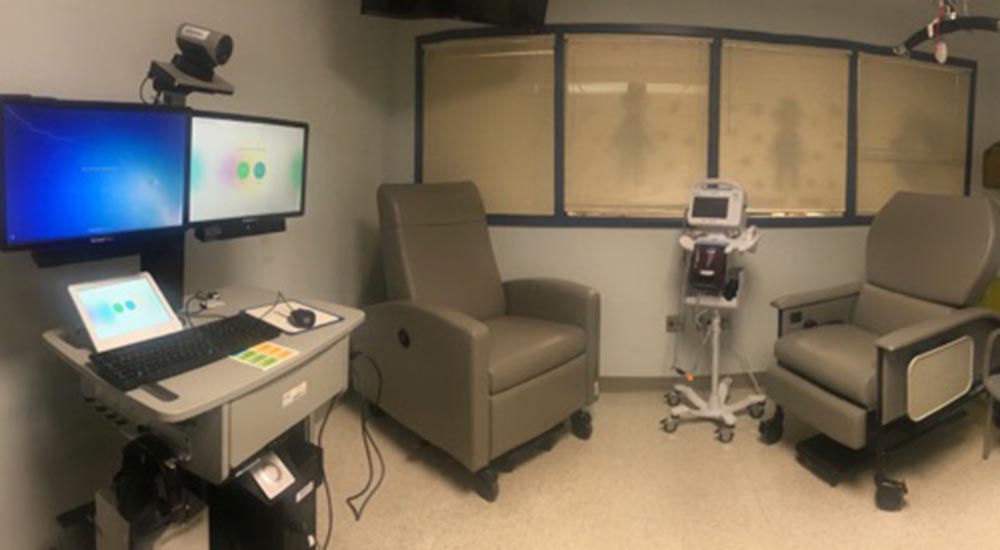Like most oncologists, Dr. Vida Passero often oversees her patients’ chemotherapy treatment. In her case, though, some of those patients just happen to be 100 miles away.
Passero leads the country’s first remote chemotherapy clinic. She also heads the hematology and oncology division of the VA Pittsburgh Healthcare System.
From her office in Pittsburgh, Passero oversees cancer care and chemotherapy treatment for Veterans at the James E. Van Zandt VA Medical Center. The office is in Altoona, Pennsylvania — a two hour drive east of the medical center.
During appointments, the trained staff at the virtual cancer care clinic in Altoona uses state-of-the-art tools such as the TotalExam 3 camera to send images and live video to Passero and the oncology team in Pittsburgh.
For Veterans in central Pennsylvania, the clinic offers the opportunity to receive chemotherapy treatment without making the long trip to the Pittsburgh VA facility. As a result, the convenience makes a huge difference for patients and their families, said Passero.
“Patients and caregivers tell me, ‘We love this technology because it saves us so much travel, time, and money,’” she said.
A team effort
Passero first wrote a proposal to remotely administer chemotherapy ten years ago. But she said the health care system was not ready at the time.

Dr. Richard Stone, executive in charge for the Veterans Health Administration, joins in on a remote chemotherapy visit.
In 2011, Passero and the Pittsburgh oncology team started remote electronic consultations. As telehealth technology improved and patient interest grew, remote chemotherapy became more attainable. Finally, in January 2018, the virtual cancer care clinic saw its first patient.
Throughout the process, Passero said the team in Altoona remained committed to the remote chemotherapy project. And Altoona staff members, including Advanced Telehealth Clinical Technician Nicole Conley, have been instrumental to the program’s success.
“Explaining this clinic is a little abstract in most people’s minds. Similarly, It’s abstract in physicians’ minds,” said Passero. “But with Nicole there to give this introduction to the patients and their loved ones, it’s no longer this unknown.”
Receiving treatment from a doctor on a TV screen can feel unfamiliar to patients at first. But Conley said the communication, collaboration, and camaraderie between the Altoona and Pittsburgh facilities make Veterans and caregivers feel comfortable throughout treatment.
“It is really one hand helping the other,” said Conley. “We’re just one big happy family. And that’s what the patients feel when they come in here. It’s become a truly monumental program for patients and their treatment.”
The next frontier
Before a new patient’s first remote chemotherapy appointment, nurses, pharmacists and technicians in Altoona create an individualized treatment plan with oncologists in Pittsburgh. Health care providers at the Altoona clinic have full testing, lab work, and radiology capabilities on-site. And after each visit, Passero conducts a video telehealth check-in with patients.
“If they can receive treatment in an outpatient setting in Pittsburgh, they can also receive that treatment in Altoona,” said Passero.
“This is going to be the next frontier,” she said.
Passero said other sites are looking to adopt the remote chemotherapy model that Altoona has pioneered.
“We were able to get this project, which was thought to be impossible, off the ground,” said Passero. “Since then, people in the private sector have been asking, ‘How did you do this?’ It just shows how VA can be innovative.”
Meanwhile, Conley said medical professionals often pick her brain about the remote chemotherapy program. “They all say, ‘Wow, this is what you are doing?’ and want more and more information.”
Visit the VA Office of Connected Care website for more information on VA telehealth programs.
Treva Lutes works in the Office of Connected Care Communications.
Topics in this story
More Stories
Study underscores important role COVID vaccination can have in protecting Veterans from infection and reducing long-term health consequences
Columbia VA’s robotic surgery teams completed their 800th robotic surgery and are on schedule to hit 1,000 by the end of the year.
In a decentralized clinical trial, Veterans can participate from their own homes or local VA instead of having to travel to a research site.






